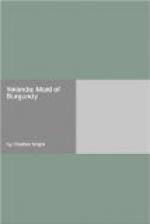“There can be no harm, Max. If you knew all,—if I could tell you all,—you would understand. The words can harm neither of us.” She hesitated and, with drooping head, continued: “And they are to me as the sun and the south wind to the flowers and the corn. You already know all that is in my heart, or I would not speak so plainly. In all my life I have known little of the sweet touch of human sympathy and love, and, Max, my poor heart yearns for them until at times I feel like the flowers without the sun and the corn without the rain,—as if I will die for lack of them. I am almost tempted to tell you all.”
“Tell me all, Yolanda,” entreated Max, “for I, too, have suffered from the same want, though my misfortune comes from being born to a high estate. If you but knew the lonely, corroding misery of those born to a station above the reach of real human sympathy, you would not envy, you would pity them. You would be charitable to their sins, and would thank God for your lowly lot in life. I will tell you my secret. I am Maximilian of Hapsburg.”
“I have known it since the first day I saw you at Basel,” answered Yolanda.
“I have felt sure at times that you did,” responded Max, “though I cannot think how you learned it. Will you tell me of yourself?”
The girl hung her head and hesitated. Once she lifted her face to speak, but changed her mind.
“Please don’t ask me now. I will tell you soon, but not now, not now. Be patient with me. I do pity you. I do, I do. If we could help each other—but we cannot, and there is no use longing for it. I sometimes fear that your attitude is the right one, and that it is best that we should part and meet no more.”
The proposition to part and meet no more was good in theory, but Max found that the suggestion to make a fact of it frightened him.
“Let us not speak of that now,” he said. “The parting will come soon enough. You will surely deem me cold and unworthy, Fraeulein, but you cannot understand. One may not call a man hard and selfish who plucks out his eye for the sake of a God-imposed duty, or who deliberately thrusts away happiness and accepts a life of misery and heartache because of the chains with which God bound him at his birth.”
“Ah, I do understand, Max; I understand only too well,” answered the girl.
I have often wondered why Max did not suspect that Yolanda was the Princess Mary; but when I considered that he had not my reasons to lead him to that conclusion, I easily understood his blindness, for even I was unconvinced. Had I not overheard Castleman’s conversation with Yolanda on the road to Strasburg, after meeting De Rose, the supposition that the burgher girl travelling unattended with a merchant and his daughter could possibly be the Princess Mary would have been beyond the credence of a sane man. The thought never would have occurred to me. Even with Castleman’s words always ringing in my ears, I was constantly in doubt.




